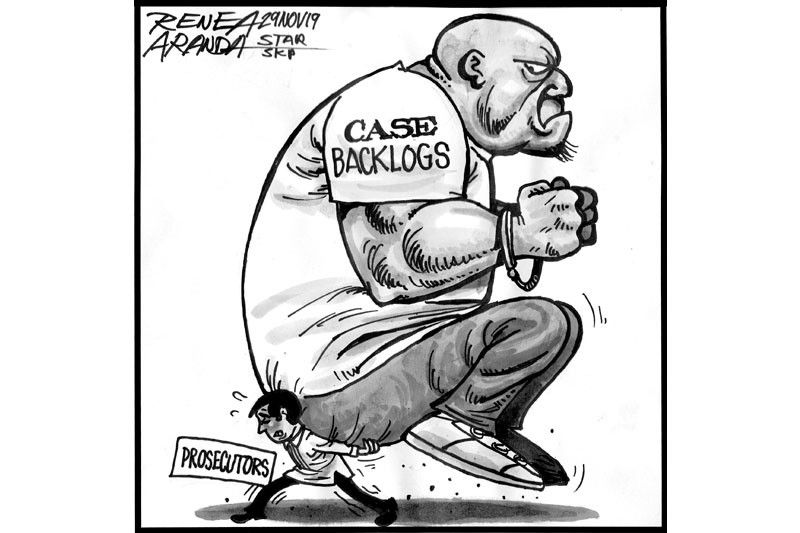EDITORIAL - Speeding up justice

Why do the wheels of justice move at snail’s pace in the Philippines? Several factors have been blamed: corruption, systemic weaknesses, a heavily politicized system of appointment that gives more weight to connections rather than merit.
Legal professionals have pointed to another reason: judges and prosecutors are overwhelmed by the sheer number of cases. As the population grows, cases pile up with no corresponding increase in the number of prosecutors and judges.
Since the start of the Duterte administration in 2016, at least 4,000 cases have accumulated, according to the Department of Justice. These are on top of the 14,000 that were pending when the administration came in, the DOJ said.
Ideally, each court should have a prosecutor. At present, however, government prosecutors typically handle two or more courts. In Region 6 or Western Visayas, only six prosecutors handle 41 courts, the DOJ noted.
In addition to their regular work, provincial and city prosecutors are deputized as ex officio legal counsels of local government units and sometimes act as the register of deeds. During elections, they also serve as vice chairs of the election board of canvassers.
The DOJ says it needs 1,000 new prosecutors to speed up work. About 500 nominations have been submitted by the DOJ to the Office of the President. The OP should do its part by speeding up its processing of nominations.
While at it, the OP should also fill vacancies in the judiciary. Retired Supreme Court senior associate justice Antonio Carpio, who never had a case backlog, says the lack of judges is partly to blame for slow adjudication in this country. He said there is only one judge for every 35,000 people – a far cry from the ideal of one judge per 20,000 population.
Appointments in the ju EDITORIAL - Speeding up justice
Why do the wheels of justice move at snail’s pace in the Philippines? Several factors have been blamed: corruption, systemic weaknesses, a heavily politicized system of appointment that gives more weight to connections rather than merit.
Legal professionals have pointed to another reason: judges and prosecutors are overwhelmed by the sheer number of cases. As the population grows, cases pile up with no corresponding increase in the number of prosecutors and judges.
Since the start of the Duterte administration in 2016, at least 4,000 cases have accumulated, according to the Department of Justice. These are on top of the 14,000 that were pending when the administration came in, the DOJ said.
Ideally, each court should have a prosecutor. At present, however, government prosecutors typically handle two or more courts. In Region 6 or Western Visayas, only six prosecutors handle 41 courts, the DOJ noted.
In addition to their regular work, provincial and city prosecutors are deputized as ex officio legal counsels of local government units and sometimes act as the register of deeds. During elections, they also serve as vice chairs of the election board of canvassers.
The DOJ says it needs 1,000 new prosecutors to speed up work. About 500 nominations have been submitted by the DOJ to the Office of the President. The OP should do its part by speeding up its processing of nominations.
While at it, the OP should also fill vacancies in the judiciary. Retired Supreme Court senior associate justice Antonio Carpio, who never had a case backlog, says the lack of judges is partly to blame for slow adjudication in this country. He said there is only one judge for every 35,000 people – a far cry from the ideal of one judge per 20,000 population.
Appointments in the judiciary and prosecution service are up to the executive; it must do its part in speeding up the administration of justice.
diciary and prosecution service are up to the executive; it must do its part in speeding up the administration of justice.
- Latest
- Trending





























